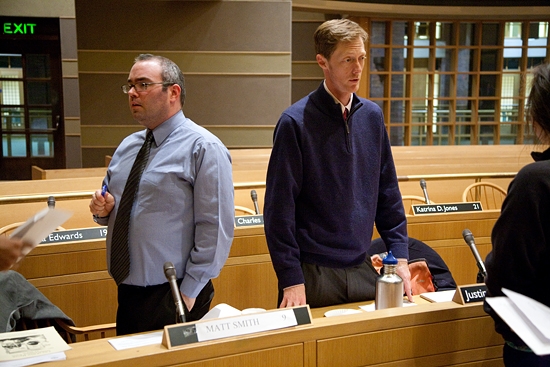
Thomas MacMillan Photo
Justin Elicker, at right, with fellow East Rock Alderman Matt Smith.
Representatives of an Ohio investment firm that stands to make millions off an expensive up-front-cash scheme with the city are making the rounds of city aldermen, trying to get them on board with the plan. East Rock Alderman Justin Elicker said no — and is working to kill the deal once and for all.
Elicker has drafted a resolution that would urge the city to cease any and all consideration of parking meter monetization plans.
Monetization was a controversial piece of this year’s contentious budget battle. The mayor proposed selling off 25 years of parking meter revenue to an Ohio investment firm, in exchange for an upfront cash infusion of $50 million. Faced with public outcry and aldermanic opposition, the move was tabled and replaced with a placeholder in the final, approved budget.
But monetization never died. It just went underground. The city has continued to look at the monetization plan as an option. Elicker and his 17 co-signers now want that to stop. The resolution says that it’s a waste of taxpayer money to continue to consider an idea that was no good to start with.
Read his resolution here.
The proposal didn’t make it onto the agenda for Monday night’s Board of Aldermen meeting. That’s because — depending on whom you ask — Elicker may not have gotten his submission in before the noon deadline Monday.
Before the start of Monday’s meeting, Elicker spoke about his resolution. He said he was inspired to draft it after he and a number of other aldermen were approached by representatives of Gates Group Capital Partners, the Ohio investment firm.
“Gates has been talking with aldermen,” Elicker said. “They say they’re trying to explain it to us in a better way.”
The wording of the deal has not been changed at all, Elicker said. But Gates representatives are saying that it wasn’t explained properly the first time out, Elicker said.
The East Rock Aldermen said he is nevertheless clear that the monetization is a bad idea for the city. It would mean forking over a projected $120 million in revenue for $50 million up front, he said.
People are saying, “We shouldn’t mortgage our future,” Elicker said. “And I think this is worse.”
In a mortgage, the homeowner is responsible for paying back the money. “The mayor doesn’t own the house,” he said. The Board of Aldermen doesn’t own the house. Current city lawmakers will be long gone when this mortgage comes due.
The city has been working on this deal for three years, Elicker said. That’s too much time, energy, and money spent on a bad idea, he said.
The mayor calls the monetization idea an imperfect but necessary way to plug a multiyear budget gap without making more painful cuts.
West Rock Alderman Darnell Goldson said before the meeting that he was asked to sign onto the resolution and declined. He said it’s irresponsible to take something off the table without putting something else in. That is, aldermen shouldn’t pull monetization without offering another way to make up the multi-million-dollar hole in the city budget.
Elicker rejected this objection. There are plenty of bad ideas that are off the table, and rightly so, he said. No one’s talking about selling City Hall. No one’s talking about selling public school wall space to Pepsi. “Because it’s a bad idea,” Elicker said. So is monetization, and it should be off the table, he said.
Elicker went on to offer a couple of revenue-generating ideas. He mentioned implementing parking fees for downtown parking on weekend nights. When out-of-towners flood the clubs, they should pay for their use of city streets, Elicker argued.
The city might also be able to make money by privatizing the stormwater authority, he said.
Another option is taking on debt, Elicker said. In some cases, that can be a good idea, he said. For instance, the city had to borrow money to buy the new toters for recycling. But that money will be more that recouped by the savings that will come from increased recycling, he said. Some debt ends up in a net budget gain, he said.
Elicker said he had initially sought to have his anti-monetization resolution on the agenda for Monday’s meeting. He sent it in before the noon deadline so it could go on the board’s last-minute “suspension” agenda, he said.
But board President Carl Goldfield said he didn’t get word of it until 1 p.m., when it was too late to put it on the agenda. Elicker may have sent the proposal in to legislative staff, but it needs to get to him before noon, Goldfield said.
The suspension agenda is for time-sensitive items, he said. Other items need to be in six days in advance.
The resolution will appear on the agenda for the Board of Aldermen’s next meeting, on Dec. 6.